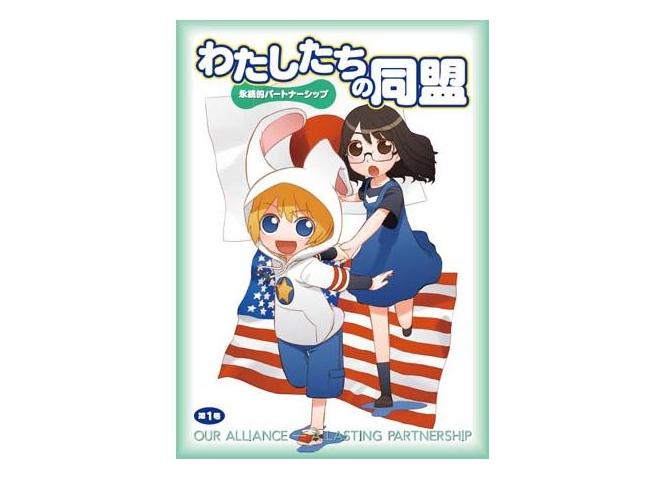The U.S. military is set to release 20,000 copies of its newest weapon aimed at winning over the hearts and minds of Japan’s youth. Earlier this month, the U.S. force’s “public affairs” office in Japan called up the American Free Press (AFP) and gave them a handful of quotes promoting the event, which coincided with the American diplomatic attendance at the 65th anniversary of the atomic bomb dropped by the United States on Hiroshima as well as the 50th anniversary of the U.S.-Japan security treaty.
The U.S. military has produced a four-part manga series in Japanese titled, “Our Alliance – A Lasting Partnership.” The BBC, Yahoo! News and various other sources picked up the AFP story without any mention of the obvious – this is pure propaganda concocted for the sole purpose of brainwashing Japan’s youth into accepting the massive American military presence right in their backyard.
 At a time where opposition to the 47,000 U.S. troops stationed in Okinawa and other parts of Japan has reach a tipping point, it seems the new U.S. strategy may be to simply outwait the more vocal older generations and instead focus on the younger generations who are already largely apathetic to such issues.
At a time where opposition to the 47,000 U.S. troops stationed in Okinawa and other parts of Japan has reach a tipping point, it seems the new U.S. strategy may be to simply outwait the more vocal older generations and instead focus on the younger generations who are already largely apathetic to such issues.
In the first issue of the comic (which can be seen here), an American boy, Usa-kun (U.S.A.-kun), comes to Japan and befriends a Japanese girl called Arai Anzu (sounds like “Alliance when spoken by Japanese). He tells her he has come to defend her home because they are “important friends.”
“It’s good to have a friend you can rely on to go with you,” the little girl concludes.
Typical of a lot of reporting, the news media merely regurgitates the press release given to them without adding any neutrality to the story, submitting obediently and serving as mouthpiece to the story’s “source” – which in this case was just a phone call with no apparent follow-up or questions challenging the motives of the manga.
Some gems spewed by U.S. forces’ propaganda office rep, Neil Fisher, include explanations on how the cute bunny-like characters “explore and learn about the U.S. military in Japan and its role in the U.S.-Japan alliance.” He nearly gives away his hand when he admits the U.S. chose manga because it’s “a very common way of communicating in Japan,” or “It is read as much if not more than newspapers” and “A lot of people love manga… Manga is a very light-hearted way to carry information.”
This isn’t the first time the U.S. has used comics to infiltrate the minds of Japanese children. In 2008, amid heavy opposition to an American nuclear powered aircraft carrier being permanently stationed at Yokosuka just south of Tokyo, the U.S. handed out 26,000 copies to children and young residents of a 200-page comic staring an American navy hero. The comic depicted the U.S. navy servicemen as ideal neighbors at a time when safety concerns over nuclear energy and crimes committed by Americans stationed in the area were in the spotlight.


Comments
There is nothing worong with wanting to be closer to the japanese people. America is not as incidious as some would say. I am moving to japan soon, but I still love america. The thing is lets say you are a kid on the play ground, and you are getting the beaten up rather badly. America would be the kid who is much bigger, and steps in to beat up the bully. Them he would take care of your cuts and bruses, and treat you to some of what is in his lunch box if you agree to be friends, and gang up aginst bullies.
Insidious. But sooooooo cuuuuute~~~<3
Popular manga is often adapted into anime (Japanese for animation) once a market interest has been established. Anime Manga Wholesale
Montana Blu Perfume for women MONTANA BLU was created by the design house of Claude Montana. Valeria Blu-Ray